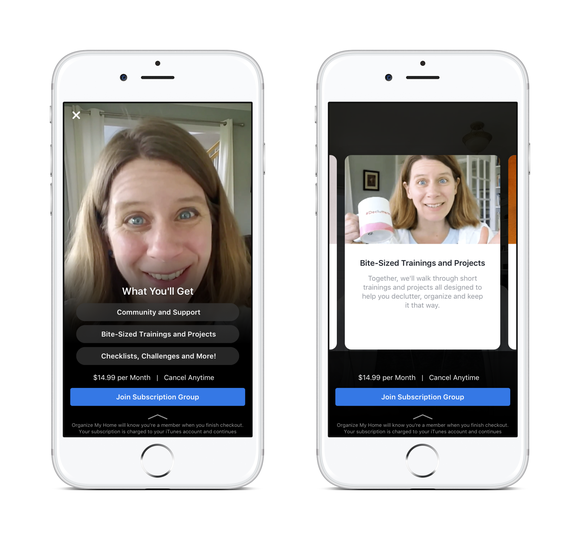Facebook Just Launched a Subscription Product, but It's Not What You Think
In April, Facebook (NASDAQ: FB) CEO Mark Zuckerberg inadvertently triggered some speculation that the social network was considering a paid version of the service when he responded to a lawmaker, "Yes, there will always be a version of Facebook that is free." The subtle implication there was that at some point in the future, maybe there would be a version that isn't free. In a separate interview, COO Sheryl Sandberg noted that being able to opt out of targeted advertising "at the highest level" would "be a paid product." With all of the recent scrutiny over Facebook's data practices, demand for such a product is likely as high as it's ever been.
Facebook just unveiled a brand-new subscription product -- its first ever -- but it's not what you think.

Image source: Facebook.
Testing out subscriptions
Yesterday, Facebook announced that it was testing a new subscription offering for groups, allowing group administrators to implement subscriptions. Some administrators devote a substantial amount of time to building their groups and communities and provided feedback to Facebook that being able to get direct support from group members would help them bolster engagement and create more content.
Like all new features that Facebook introduces, the subscription offering will start out as a small test pilot available to a small number of groups and users. Facebook will then solicit input and feedback from participants, and combined with the engagement data and metrics that it collects, will decide whether or not to roll it out more broadly.
The move follows another announcement in March, when Facebook said it would soon test out ways for video creators to monetize their content and earn money directly from other users through monthly subscriptions, similar to features available on Amazon.com subsidiary Twitch, which is the dominant platform for live-streaming esports. However, Facebook has not yet rolled out that particular pilot program yet, making the new group subscription pilot technically the first such subscription product.
More where that came from?
It's not clear if Facebook intends to take a cut of group subscriptions, but presumably that would be the long-term strategy. The company had said previously that it would not take a cut of the video creator subscriptions, at least not initially while it remained a limited test pilot. Subscription groups may follow a similar model.
Exploring various types of subscription offerings is a smart move, as it will help the company incrementally diversify its business away from ads, which while wildly profitable have created countless scandals regarding privacy, data practices, and ad targeting. Ads will likely always be the vast majority of sales -- 98.5% of revenue last quarter -- but adding various types of subscriptions to the mix is a good thing. Besides, building out back-end revenue-sharing capabilities will be utterly necessary in order to compete with YouTube in general.
It still may not make much sense yet to offer a subscription version of the core service, since users may not be willing to pay a monthly fee that would offset the ad revenue that Facebook generates per user (about $7.71 per month per North American user last quarter), but one day it might.
More From The Motley Fool
John Mackey, CEO of Whole Foods Market, an Amazon subsidiary, is a member of The Motley Fool's board of directors. Evan Niu, CFA owns shares of Facebook. The Motley Fool owns shares of and recommends AMZN and Facebook. The Motley Fool has a disclosure policy.

 Yahoo Finance
Yahoo Finance 